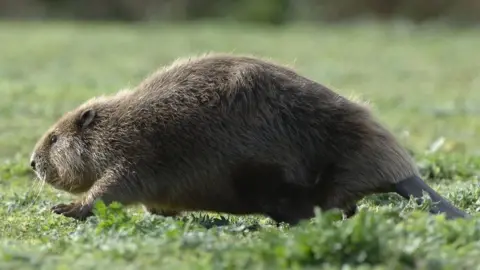Eurasian beaver to be given legal protection in England
 PA Media
PA MediaBeavers are to be legally protected in England from being captured, killed, injured or disturbed without a licence, the government has announced.
From October, it will also be illegal to damage where they breed.
Earlier this week, the Wildlife Trusts had said a delay to the expected announcement put the reintroduction of beavers to the wild "in jeopardy".
The National Farmers' Union (NFU) said a clear management plan was needed to protect farmland before any law change.
Eurasian beavers, which were once widespread but hunted to extinction 400 years ago, have been reintroduced at sites across Britain.
The first wild beavers were released in Scotland in 2009, where the species was granted legal protection 10 years later.
'Significant moment'
In England, the government has now taken the first legislative step towards securing an amendment to the Conservation of Habitats and Species Regulations 2017 that would protect beavers from October.
That comes as the wider release of beavers into the wild is currently being considered.
Tony Juniper, who chairs Natural England, said: "This is an significant moment for beaver recovery, as we see a return of this species to its natural places in England.
"We are working closely with landowners, environmentalists and other stakeholders to develop practical guidance to ensure these wonderful animals are able to thrive in suitable habitats alongside people across England."
Kits born
Craig Bennett, chief executive of the Wildlife Trusts, which have overseen the release of Eurasian beavers across Britain, said: "We're delighted to see the government give beavers the vital protections they deserve.
"It is important that guidance is now developed quickly to bring farmers and landowners on board with reintroductions of these brilliant animals, providing reassurance and, crucially, incentives to make space for beavers on their land."
This month, the trusts have seen beaver kits born in Cheshire, Derbyshire and Dorset and they have highlighted the work beavers do in holding water on the land during the current heatwave.
Trials in England and Wales have been assessing the impact of beavers on the environment, with studies showing that the semi-aquatic mammals can slow river flows with their dams, which can protect land from flooding and create habitats for other native species.
The new legislation will allow Natural England to grant wildlife management licences for landowners to control beaver populations in places where they are having a negative impact.
The NFU, which is concerned about the effect beavers can have on farmland - particularly flooding - said it had wanted to see a management plan drawn up before legislation was introduced.
Minette Batters, the NFU's president, said: "It is unacceptable that the government has pushed through this legislation at the last minute before summer recess with absolutely no detail and vague platitudes that there will be a management plan published in 'due course'.
"It is imperative that Defra now brings plans forward to manage beavers and their potential impact as soon as possible."
